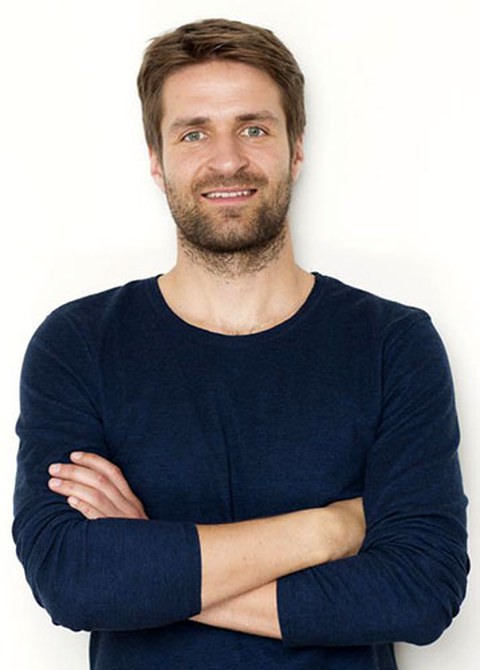The vision: solar power from every roof
(Interview from 2019)
Dagmar Möbius
Alexander Melzer studied industrial engineering at TU Dresden. After several years' professional experience in Germany and abroad, the native of Thuringia founded a renewable energy startup in Berlin in 2016. The goal was a company that would install a photovoltaic system on the roof of every house.
Mr. Melzer, how far have you come with your project?

As founder and director of zolar GmbH, 34-year-old Alexander Melzer is now responsible for 80 employees.
We want to install a solar power system on every roof in the world to make people more independent, and actively contribute to the fight against climate change. When we launched around three years ago, zolar was the first provider in Germany to offer individually planned systems over the Internet. Our online configurator allowed potential customers to adapt the individual components of a solar installation according to their needs. This was a completely new experience for people. We had to start by finding out if the public was actually prepared to buy solar products over the Internet. The first systems sold and positive customer testimonials proved us right: the idea worked. Since then, we have been perfecting the product and technology, and have grown to around 80 employees. Our goals for this year are clear: we want to install several thousand systems across Germany and generate sales into the tens of millions of euros. We are very proud of what we have accomplished as a team over the past three years. However, we must and will continue to grow if we are to drive the expansion of photovoltaics even further.
What does the company's development mean for you specifically?
A typical working week is about 60 hours long. At the moment, our focus at zolar is still on the German market, so fortunately I don't have to travel that much. Seeing the company continue to grow and hit a new target every month that had previously been declared impossible feels particularly good. It's great when satisfied customers recommend us. In the future, everyone should be able to cover 100 percent of their own energy needs from renewable sources. This is the only way we can still stop the worst effects of the climate crisis.
Back to your time at university. Why did you decide to study industrial engineering at TU Dresden?
I'm interested in a lot of things, and after graduating from high school, I couldn't decide whether I wanted to study engineering or business. Industrial engineering is a very broad field – you get to grips with a great variety of topics and receive comprehensive, wide-ranging training. TU Dresden (TUD) was already considered a very good technical institution when I started my degree in 2003, and I really wanted an excellent technical education. I also liked the campus and the atmosphere from the very first day. Another factor was the cost of living in Dresden: The city was more affordable than Munich or Karlsruhe, for example.
How does what you learned at university benefit you today?
Without studying at TUD, I would not be where I am today. Another important factor was the opportunity to study in Mexico for a year in 2005, and most importantly to gain a deep insight into in many different areas of engineering. As well as courses on renewable energy, I also took classes on nuclear technology, high-voltage technology, power plant technology, and electrical machines. The business side – in particular the tough management accounting classes with Professor Thomas Günther – was also world-class.
When did you decide that you wanted to work in photovoltaics and why?
In 2007, I got a student job at a solar module manufacturer in Dresden where I got an in-depth look at this fascinating industry. I also wrote my final-year dissertation under Professor Günther on target investment in plant engineering, looking at the example of an investment in a turnkey photovoltaic power plant in the Chilean SING electricity grid. That plant incidentally won international awards in the photovoltaic industry.
After graduating in 2012, you initially headed abroad …
I had worked as a product manager in the international sales department at Solarwatt AG when I was a student. After graduating, I moved to Canada and was one of the first employees of the project development firm Soventix Canada, where I became director after two years. In mid-2014, I decided to take a sabbatical and traveled the world for a year. After returning to Germany in early 2016, I founded zolar in Berlin with my university friend Gregor Loukidis.
What did you need to take on such an ambitious project?
My motivation was and is being proactive in the face of climate change. Our mission at zolar is to make it possible for every homeowner to produce their own clean, low-cost solar power, and to contribute to a future worth living. We provide simple solutions to what is perhaps the biggest problem facing humanity.
You see yourself as operating in the digital trades sector. What does that mean in practice?
zolar supplies photovoltaic systems at a fixed price. Using an online configurator we developed, homeowners can customize the components of their system to meet their needs. Our solar experts also provide customer-specific advice. Our installation teams or network partners assemble the systems on-site – all over Germany. The electricity that the systems generate can be used for everyday household needs and also for electromobility. The aim is to make people less dependent on the power grid. Everyone can help drive the energy transition using their own four walls, lowering their costs and reducing their carbon footprint in the process.

zolar's tailor-made photovoltaic systems are designed to meet the needs of homeowners.
What other option besides founder and CEO would have appealed to you?
Working as a manager in a large corporation was never an option for me. I was at a corporate for six months and found that I did not have the patience. I am all about rolling up my sleeves and trying to change things.
How many employees does your company have today, and what kind of people do you look to hire?
We have a number of TUD graduates working here, for example, a renewable energy systems engineer is a solar product manager with us. It would be good to get more applications from and hire more TUD graduates in the future. People who want to make an active contribution to climate protection have a good chance of a job here. That attitude is essential if they are to fit into our culture and have the necessary intrinsic motivation to master the daily challenges.
What advice do you have for budding managers?
Two useful tips from a professor at TUD were to learn to touch type and to master at least three languages. What's important in today's startup culture is to make employees part of something big. At zolar, we want nothing less than to solve the problem of climate change. That might well sound irrational and idealistic at first. However, if you break it down and start shaking things up so that you really do end up with a photovoltaic system on every roof in the world, we will be a lot closer to solving the climate crisis. It is important to me that every employee can go home at the end of the day knowing that he or she has once again contributed to progress towards our overarching vision. Our generation, and above all the generation that is currently at university, want a meaningful job; a purpose that is greater than just money, impressive-sounding job titles, or a big company car.
Finally, a typical HR question; Where do you see yourself in ten years? Would a return to research, academia or teaching appeal to you?
Unfortunately, academia and teaching never appealed to me, although I could see myself as a visiting lecturer. I want to look back in ten years and realize that zolar has really made a difference, and made it possible for everyone to generate clean solar power.
2022 Update:
Article from the "Wirtschaftswoche": Solar system start-up Zolar receives 100 million euros
https://www.wiwo.de/erfolg/gruender/investitionen-fuer-berliner-start-up-konkurrenz-fuer-dicaprio-solaranlagen-start-up-zolar-erhaelt-100-millionen-euro/28354762.html
Contact:
ZOLAR GmbH
Alex Melzer, CEO
Oranienstr. 185
10999 Berlin
Tel: +49 30 36 428 4566
Tel: 0800 2 300 600
Email
Web
